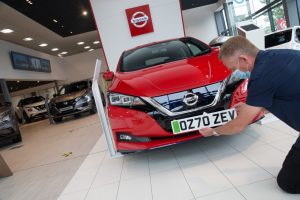Sales of brand new pure petrol and diesel cars and vans will be banned from 2030 and hybrids from 2035, the prime minister has announced.
The move brings forward the original date by 10 years and is part of Boris Johnson’s 10-point plan for a ‘green industrial revolution’.
The ban means all traditional petrol- and diesel-powered cars and vans will disappear from showrooms in 2030, although hybrids that can ‘drive a significant distance with no carbon coming out of the tailpipe’ will be allowed on sale until 2035.
As part of the plan, £1.3bn is earmarked to accelerate the the rollout of chargepoints in homes, streets, and on motorways, to make electric vehicles easier to charge up.
Meanwhile, £582m in grants will be made available for those buying zero- or ultra-low-emission vehicles to help reduce the costs.
Nearly £500m will be spent in the next four years for the development and mass-scale production of electric vehicle batteries, helping to boost manufacturing bases including in the Midlands and north-east, the PM said.
The government will also launch a consultation on the phase-out of new diesel HGVs to clean up freight transport, although no date has been set.
Success will depend on reassuring consumers that they can afford these new technologies, that they will deliver their mobility needs and, critically, that they can recharge as easily as they refuel
Commenting on the news, the Society of Motor Manufacturers and Traders (SMMT) acknowledged the ‘immense’ challenge the new date brings, but welcomed the investment in EV manufacturing and the 2035 date for hybrids.
Mike Hawes, SMMT chief executive, said: ‘We share government’s ambition for leadership in decarbonising road transport and are committed to the journey.
‘Manufacturers have invested billions to deliver vehicles that are already helping thousands of drivers switch to zero, but this new deadline, fast-tracked by a decade, sets an immense challenge.
‘We are pleased, therefore, to see government accept the importance of hybrid transition technologies – which drivers are already embracing as they deliver carbon savings now – and commit to additional spending on purchase incentives.
‘Investment in EV manufacturing capability is equally welcome as we want this transition to be “made in the UK”, but if we are to remain competitive – as an industry and a market – this is just the start of what’s needed.
‘Success will depend on reassuring consumers that they can afford these new technologies, that they will deliver their mobility needs and, critically, that they can recharge as easily as they refuel.
‘For that, we look to others to step up and match our commitment.
‘We will now work with government on the detail of this plan, which must be delivered at pace to achieve a rapid transition that benefits all of society, and safeguards UK automotive manufacturing and jobs.’
AA president Edmund King said: ‘The 2030 target is incredibly ambitious, but the transformation to electric cars is welcome.
‘Consistently, the barriers to EV ownership are: the initial cost of the car and availability, perceived single-charge range anxiety and charging infrastructure – particularly for the third of drivers without off-street parking.
‘If we can tackle these issues with considerable investment and focus, the electric revolution could flourish.
‘We are pleased that the package of measures announced is more than just a date in the diary. By investing heavily in the national charging network, battery production and providing incentives will help.
‘The concession for hybrids will be a welcome stepping stone for fleets and individuals before going fully electric.
‘One of the biggest challenges will be for car makers to change more than 100 years of combustion engine production to cater for an electric future within a decade.’

It’s not yet clear what level of incentives will be offered on pure-electric cars
RAC head of roads policy Nicholas Lyes said: ‘The car industry and those responsible for charging infrastructure now have an enormous task on their hands.
‘Production lines that for decades have been set up to build cars powered with internal combustion engines will have to be transformed to allow manufacturers to profitably build a wider range of EV models in sufficient quantities.
‘Meanwhile, the country’s public charging network will need to grow exponentially to cater for the surge in EVs on the road.’
Lyes warned that there’s ‘lots for consumers to get used to in order for them to feel confident about going electric’ and that ‘right now running an EV requires a level of planning as charging generally takes significantly longer than a visit to a fuel forecourt’.
The RAC also said electric cars will spell the end of cars with manual gearboxes ‘that so many drivers will have been used to’.
Lyes added: ‘But for the time being, the biggest barrier to going electric remains the comparatively high upfront vehicle cost, so we hope the government’s announcement will pave the way to lower list prices, thereby accelerating take-up.’
The 10-point plan also includes plans to have the UK’s first town entirely heated by hydrogen by the end of the decade, a renewed push on nuclear power and support for restoring nature and for walking and cycling.
- Register as a Car Dealer member and personalise your experience here
- Car Dealer Mag issue 152 is out now – Read it here
- Join our breaking news WhatsApp group – Click here to join now



































